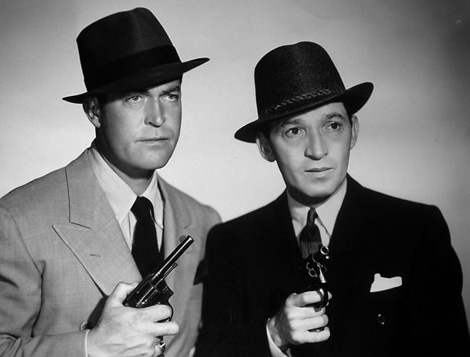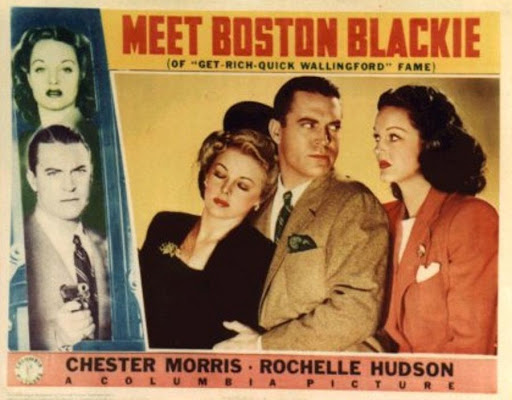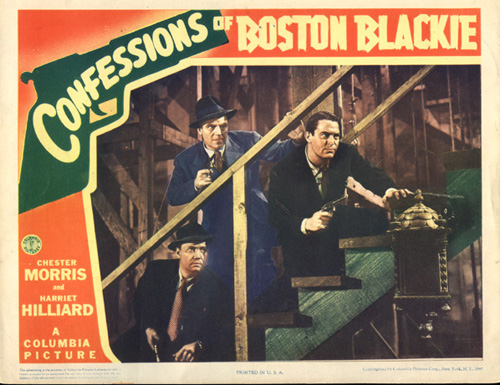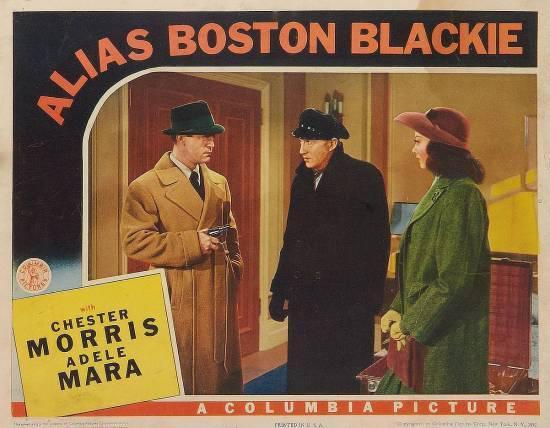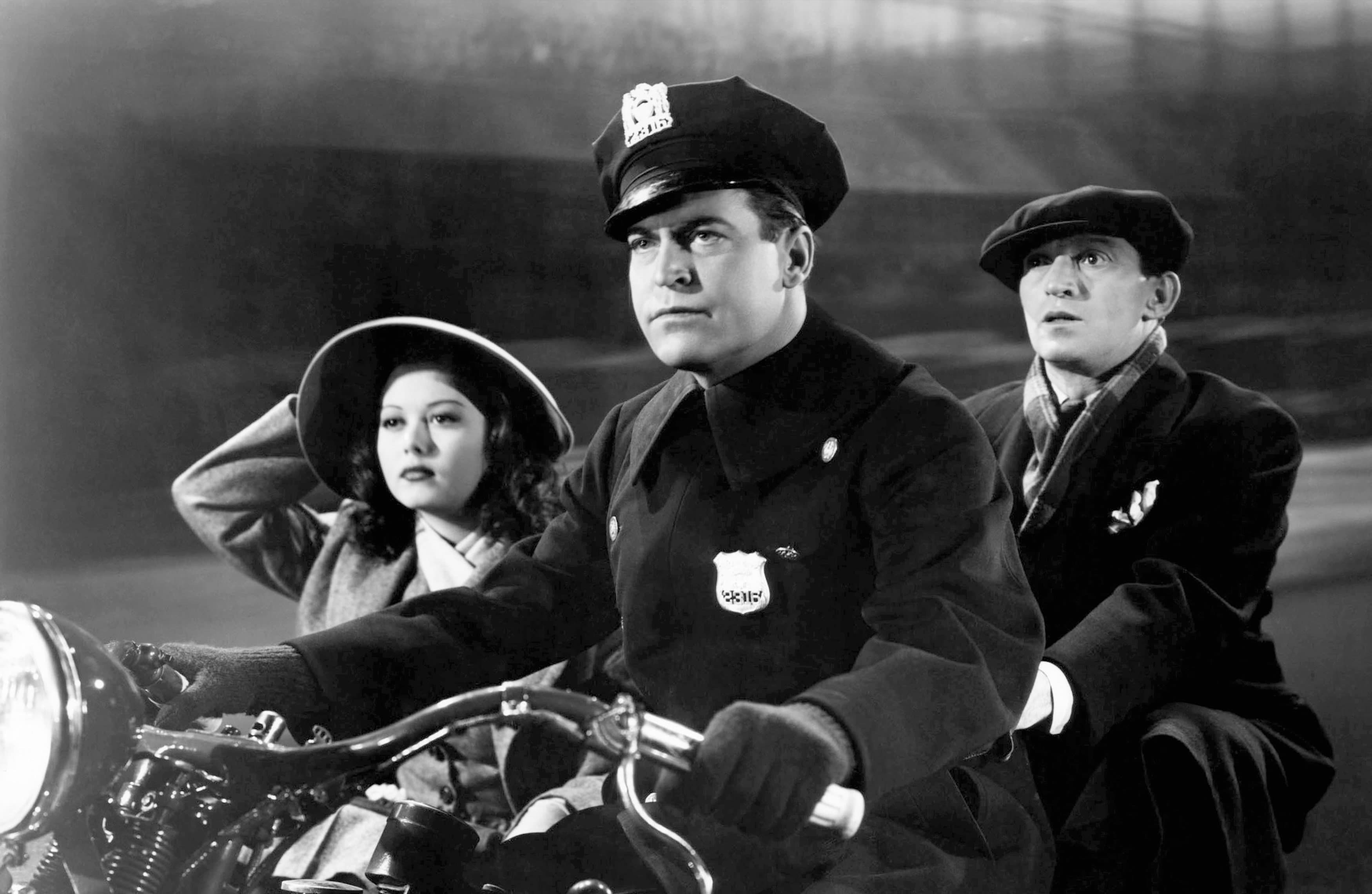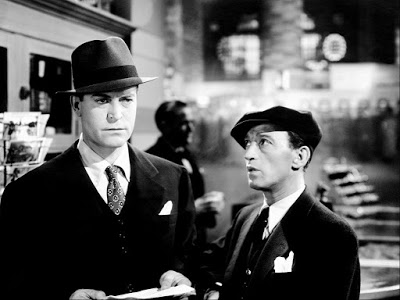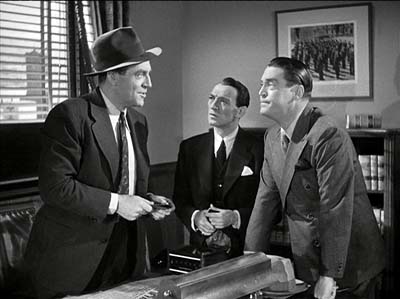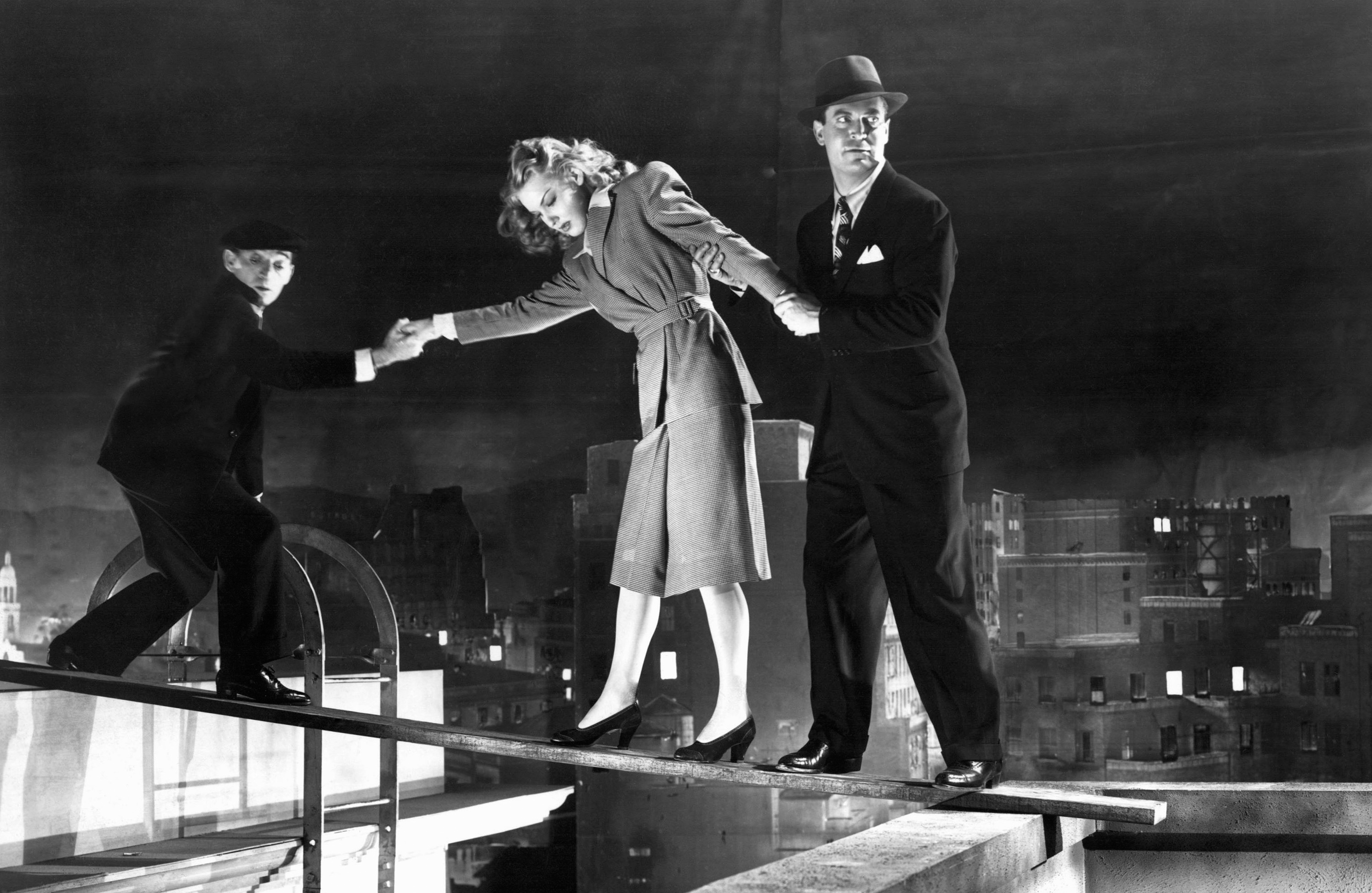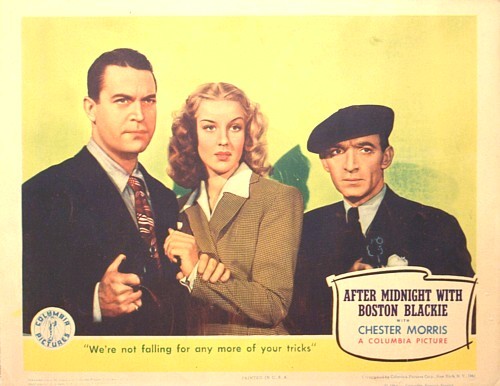Boston Blackie -
The First Five Films
Meet Boston Blackie (1941) – 7.0
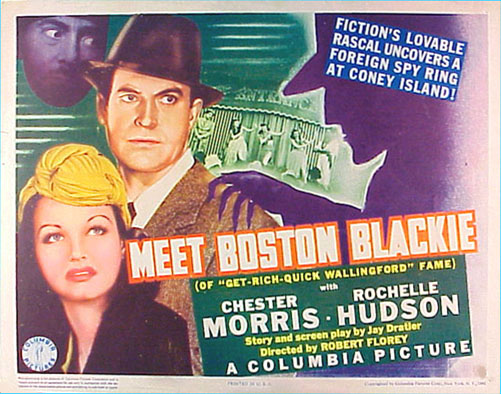
This is the first in the fourteen film series from Columbia starring Chester
Morris as Boston Blackie and it is surprisingly good for a B film coming
in at about 60 minutes. Boston Blackie is based on a character created by
Jack Boyle in 1914 in his fictional stories. Though there isn't a lot known
about Boyle, he strikes me as an interesting author - an opium addict and
a thief - he wrote his first Boston Blackie story while in the hoosegow.
Blackie was a gentleman jewel thief a - a theme that was clearly popular
at the time with The Saint and The Lone Wolf also falling into that genre.
In the books he was also into opium. But by the 1940's the opium and the
thievery was a no-no and in the films Blackie is a reformed man but is still
always suspected by the cops whenever some jewels go missing or a man is
killed. So he has to solve the case himself - a theme that runs through many
of the films I have seen so far.
The first Blackie film was in 1914 and there would be another 10 during the
silent period - one starring Lionel Barrymore - but it was Chester Morris
who is most associated with the character playing him from 1941 to 1949.
Morris's name is pretty familiar to me but I can't recall him in any other
film that I have seen and I was expecting a bit of a clunker from his square-jawed
blank face but he is actually fairly charming and fast talking.
This one begins as a murder mystery on a ship with Blackie suspected of it
and slowly morphs into a spy caper in which Blackie has to track down the
enemies of the good old USA. The film moves at the speed of light and has
a few really good scenes - a chase that starts on foot in The Tunnel of Love
and then becomes a car chase in the city and out into the country and on
to a train in particular was well shot. Director Robert Florey (Murders in
the Rue Morgue) was an experienced hand and had made a number of crime films
by this time and has some nice touches along the way. I just hope the quality
of this series continues along this level. We shall see.
Confessions of
Boston Blackie (1941) – 5.0
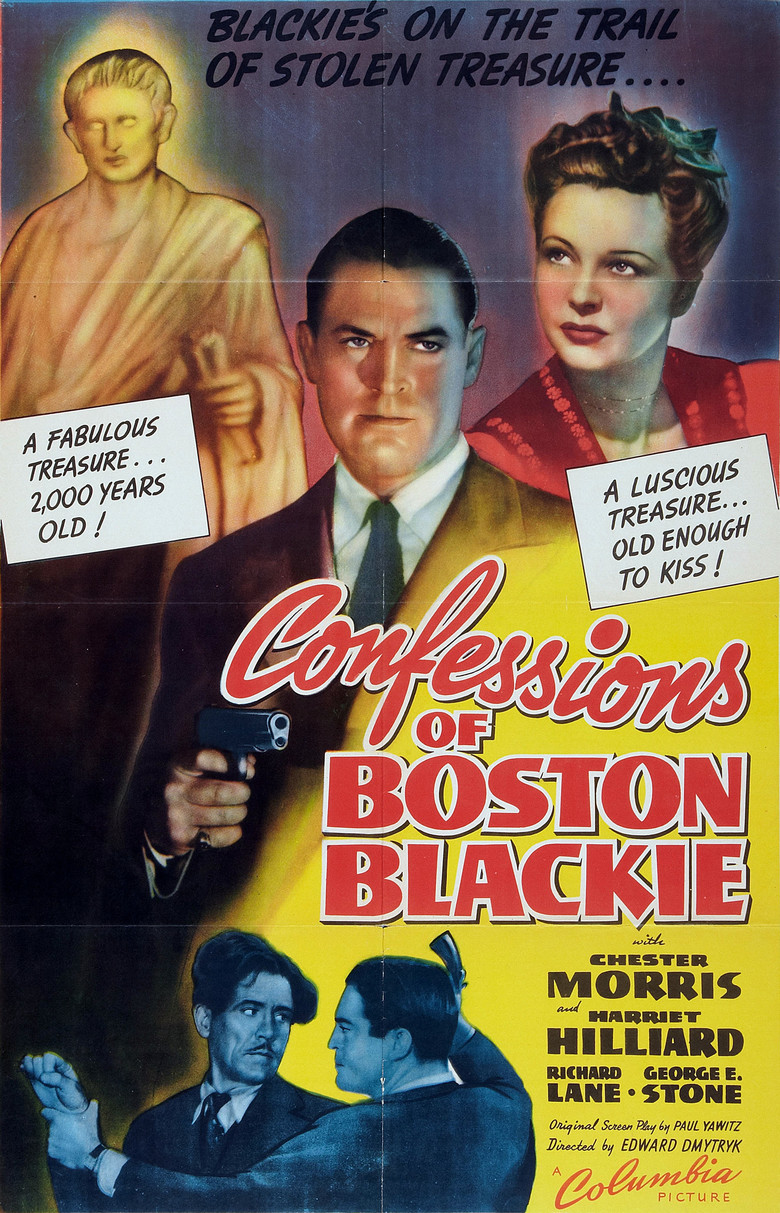
This second in the Boston Blackie series already sees it fall a bit squarely
into B film territory which is a shame after the first one was so good. This
still moves quickly with no fat growing around it but the script and crime
just isn't all the compelling - Blackie once again is suspected by Inspector
Farraday of a crime he didn't commit and he has to figure it out with Farraday
hounding him all the way - a theme I expect I will see a lot of in the series.
Farraday is played by Richard Lane in all of the films in the series and
they have a sort of love hate relationship in which Farraday is always after
Blackie but also aready to give him room to prove he is innocent. There is
also of course the good woman - in this case the woman is played by Harriet
Nelson who was already married to Ozzie and had her two boys David and Rickey.
This one has something to do with a dead body being hidden in a fake statue
and everyone is chasing after it. A few good sidemen that you see in lots
of these old B films help out - the bumbling Lloyd Corrigan as his wealthy
friend Manleder, Blackie's assistant Runt is George Stone who plays the character
nearly in every film and Farraday's sergeant is the familiar face of Walter
Sande. It is directed by Edward Dmytryk, still early in his career and doing
B films - that was to end in a few years with Tender Comrade (written interestingly
by fellow Hollywood Ten Dalton Trumbo), Murder My Sweet and Back to Bataan.
Alias Boston Blackie
(1942) – 6.0
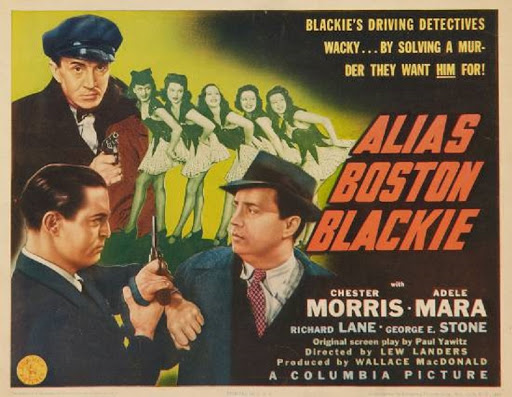
This Boston Blackie Christmas movie feels appropriate this time of the year.
This is the third in the series and like the previous two it moves like a
freight train but not with the weight. It again follows the same formula
- Blackie is suspected of a crime - in this case helping a jail bird escape
- by Inspector Farraday and so has to sort it all out to prove his innocence.
These films so far get by on the charm of Chester Morris and the supporting
cast around him. This ends with the oldest B trick in the book with a confession
while the police who just happen to be outside listen in. As only Hollywood
can do, all the crimes that Blackie committed to prove his innocence are
conveniently forgotten.
I downloaded to Kindle a Boston Blackie book and read through a bit of it
to get a flavor. It is not great writing but sort of time warp interesting.
Jack Boyle the author of the stories basically wrote a bunch of short stories
for magazines and then at some point put many of them together, edited them
a bit and called it a novel - but it explains why none of the narrative threads
seem to last too long. In the one I am reading Blackie is a happily married
man with a heart of gold but who just likes to steal jewels. His wife doesn't
mind. No wife in the movies with an everchanging list of actresses who come
and go.
I have been reading a bit on the HUAC hearings of the 1950's when Congress
was attempting to ferret out Communists in Hollywood. A lot of lives were
ruined by it all - a number of writers were sent to jail - one being Edward
Dmytryk who directed the previous Blackie film but still went on to a solid
career. One of the more tragic cases is Larry Parks, who plays the escaped
con in this one. He had a breakthrough a few years later when he was nominated
as Best Actor for portraying Al Jolson in the 1946 Al Jolson Story. A few
years later he starred in Jolson Sings Again. He was also married to actress
Betty Garrett (On the Town) in 1944. His best man at the wedding was his
good friend Lloyd Bridges. At the beginning of the film you can spot Bridges
as the bus driver. Both of them got caught up in the HUAC hearings - both
had belonged to the Communist Party. Parks resisted naming names but finally
broke down and listed some; Bridges spilled the beans more easily. Parks
was put on the blacklist, dropped by Columbia and didn't work much again.
Bridges had trouble finding work as well as he was put on the “graylist”
- but he was able to get the role of Mike Nelson on the syndicated show Sea
Hunt - none of the big 3 networks would touch him. From there he went on
to a very solid career. There are times this country just goes crazy.
Boston Blackie
Goes Hollywood (1942) – 6.0
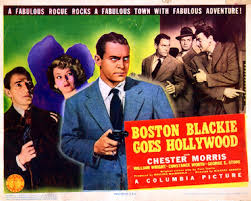
A nice return to form in this the fourth film in the series. I have had this
series sitting around for a few years and am glad I finally got around to
seeing a few of them - there are 14 of them - so I will get back to the series
at some future point - but they have overall been solid to good B films.
This one nicely mixes humor with chaos as $60,000 and a stolen diamond switch
hands like a three card Monte game. And then there are of course ants in
the pants as well.
All the gang are in place for this one with the Runt, Farrady and Manleder
all in it. The Runt played by George Stone is one of those sidemen treats
from these B films. A lot of times they provide the comedy but the Runt is
one of those guys who knows every crook this side of the Atlantic - and was
once an able crook himself. Born in Poland but immigrating as a child, he
made a career of playing guys in the underworld - sometimes tough, sometimes
soft. You will see his name often pop up in the credits of early episodes
of the Perry Mason show where he was the court clerk. By that time he was
nearly blind.
After Midnight
with Boston Blackie (1943) – 5.5

Boston Blackie - ex-jewel thief, now all-around good guy - is back for this
fifth film in this Columbia series. A group of stock actors seems to have
settled into the series - Chester Morris as Blackie, his righthand man George
Stone as the Runt, Richard Lane as Inspector Farraday, Walter Sande as Farraday's
dimwitted assistant and Lloyd Corrigan as the eccentric millionaire friend
of Blackie. All familiar faces if you watch many B films of the period. This
one moves along quickly enough as a near farce when diamonds change hands
with regularity. It has a huge plot hole that even a B film should be ashamed
of but I guess we are not supposed to be paying that much attention.
One of Blackie's old friends gets out of jail and heads for the diamonds
that he hid years ago but his partner (Cy Kendall) in that crime is waiting
for him. So is his daughter (Ann Savage) who hasn't seen him in years. When
her father disappears, she calls in Blackie to figure it out. Runt is trying
to wed the love of his life - Dixie, a burlesque dancer who sashays more
than walks but crime keeps getting in the way. Farraday seems to have a full
time job in following Blackie and arresting him every time there is a jewel
robbery in the city. The cops keep getting dumber in each film. One plot
point that intrudes is a scheduled black out for the city - it was war time
and I guess we were doing that at least on the West coast.
Ann Savage has one of the great names (not her real one) in Hollywood. She
is best known for being the hard bitten dame in Detour and a few other crime
films - a pretty blonde woman gone sour. Here though she is as sweet as sugar
and generates zero heat. Detour was still two years away and she was just
getting started in B movie hell. It is directed by Lew Landers, another director
who spent his entire career in B films before moving to television in the
early 1950s - his best known film is The Raven with Karloff and Lugosi.
